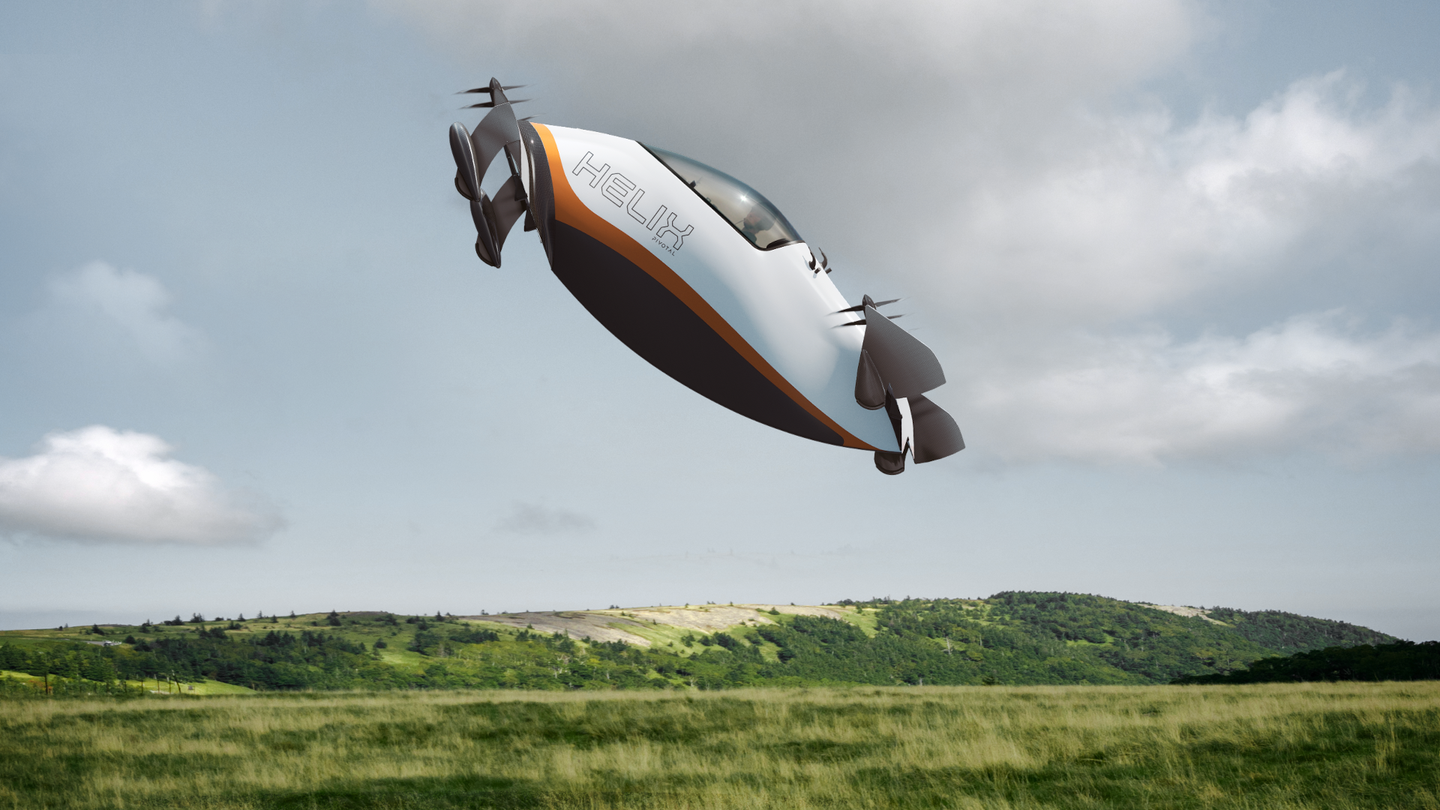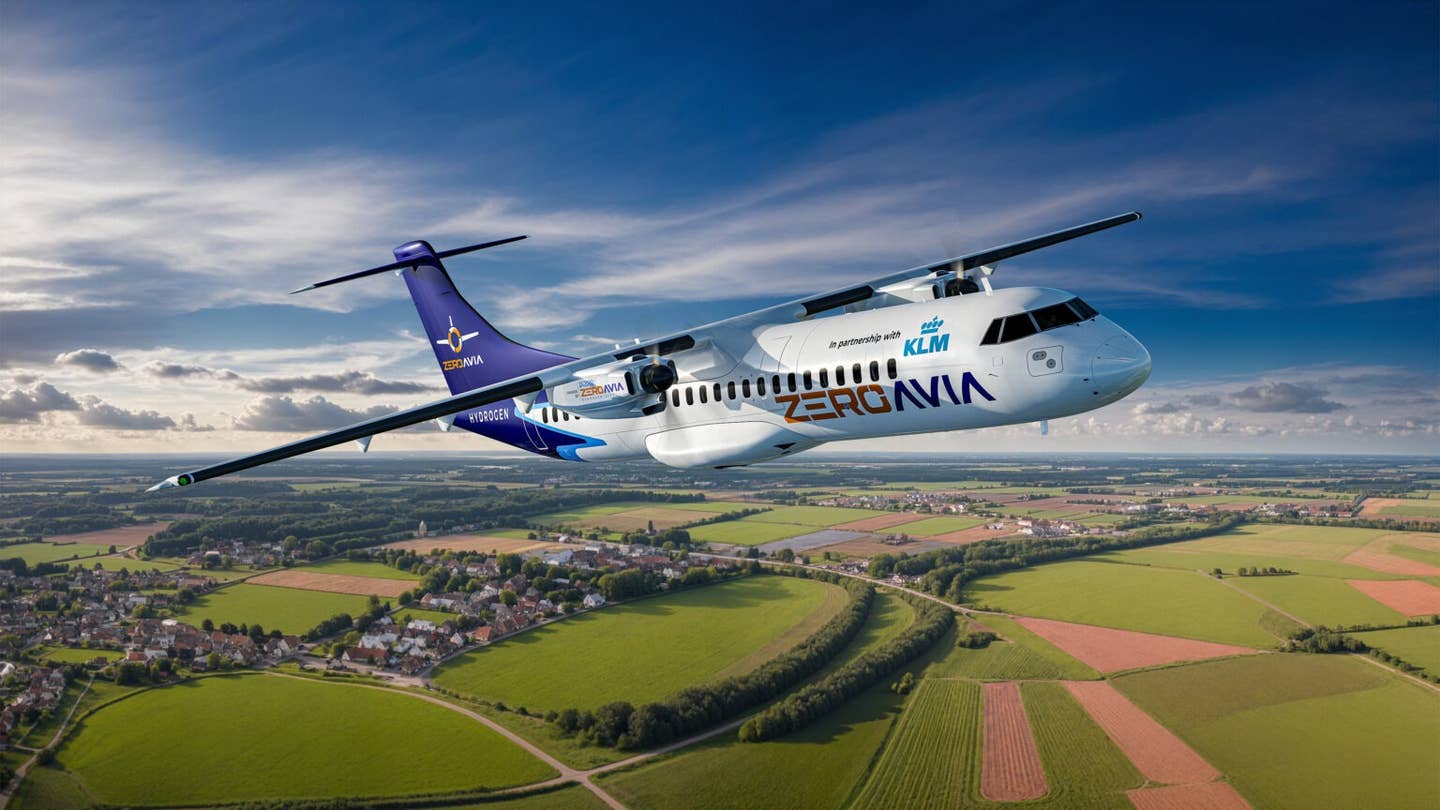Pivotal Delivers First Four BlackFly Personal Aircraft for Air Force Evaluation
The light eVTOL manufacturer is working with AFWERX, the innovation arm of the U.S. Air Force, to assess the outlandish aircraft for a range of use cases.

Helix, the successor to Pivotal’s BlackFly, features a unique tilt-aircraft design. [Courtesy: Pivotal]
Pivotal, the manufacturer of a single-seat electric vertical takeoff and landing (eVTOL) aircraft designed primarily for recreational use, has attracted the attention of the U.S. military.
The company this week said it was selected by Modern Technology Solutions Inc. (MTSI) and AFWERX, the innovation arm of the U.S. Air Force, to participate in Agility Prime, a division of AFWERX dedicated to vertical lift technologies.
Under the new agreement, Pivotal delivered the first four of eight BlackFly preproduction eVTOLs and two flight simulators for lease to MTSI, which will be used in AFWERX and Air Force evaluations. MTSI supports AFWERX with flight testing and program management.
“AFWERX's and MTSI's decision to partner with Pivotal is a strong endorsement of our platform's maturity and a milestone on our journey to mission relevance,” said Ken Karklin, CEO of Pivotal.
In addition to aircraft and simulators, Pivotal will provide pilot training and support services to its partners. The Air Force will leverage the partnership to perform a range of remotely piloted missions. It also plans to assess the benefits of the company’s unique “tilt-eVTOL” architecture for a variety of use cases.
Unlike many eVTOL designs that feature tilting motors or propellers, Pivotal decided to slant the entire airframe during the transition from hover to vertical or forward flight. This reduces aircraft weight, complexity, and points of failure, the company said.
“AFWERX continues to look for ways to accelerate our understanding of eVTOL operations, maintenance, logistics, and potential use cases." said Lieutenant Colonel John Tekell, branch chief of Agility Prime. “One-two person eVTOLs have potential for several missions including special operations, surveillance, and disaster and emergency response with local command and control at a much lower price point than traditional helicopters.”
Pivotal, MTSI, and AFWERX will conduct the program out of New Braunfels National Airport (KBAZ), just 30 miles north of San Antonio in Texas, and the Air Force Research Laboratory’s National Advanced Air Mobility Center of Excellence at Springfield-Beckley Municipal Airport (KSGH) in Ohio. The goal will be to see if the outlandish design is a good fit for Air Force missions.
“Over the next eight months, we will fly eight BlackFly eVTOL aircraft in different environments to test their mission effectiveness and suitability in military uses,” said Vance Drenkhahn, executive vice president of MTSI’s defense services division.
BlackFly’s ability to fit inside a 16-foot trailer and go from storage to the sky in less than 30 minutes may be piquing the Air Force’s interest since these features make the aircraft easy to transport and deploy.
They are also present on Helix, Pivotal’s flagship model unveiled in October. Helix makes several upgrades to BlackFly, including a redesigned canopy and flight deck, more comfortable seating, and improved power, propulsion, and performance.
Helix hit the U.S. market in January, and customers can now purchase the aircraft for $190,000. For comparison, Helix costs slightly more than a Texas Aircraft Colt but less than a Beechcraft G36 Bonanza, Diamond DA40 NG, or Cessna 172 Skyhawk. Pivotal expects initial shipments to begin in June.
In addition to the strange tilt-aircraft design, Helix is notable for its low barrier to entry. With an empty weight below 350 pounds, the eVTOL qualifies as a Part 103 ultralight, meaning the FAA does not require pilot certification to fly it.
Instead, Pivotal will train customers how to fly the aircraft—which is commanded using fly-by-wire controls and a pair of simple joysticks—at its Palo Alto, California headquarters. In lieu of hundreds of hours of flight training, the company claims customers will be ready to fly in just two weeks, with recurrent training required after they receive their wings.
For those fearing an influx of inexperienced pilots, it may be reassuring that Helix comes with some restrictions. Customers will be required to fly during daytime and in Class G airspace, far from congested airspace and airports. They will also be restricted to about a 20 sm (17 nm) range and 63 mph (55 knot) cruise speed. In addition, pilots must be at least 18 years old, weigh less than 220 pounds, and stand no taller than 6-foot-5.
Customers can place a nonrefundable $250 deposit fee on Pivotal’s website to begin their order. To solidify a production slot and shipping date, they will need to deposit another $50,000 within five business days of the initial order.
Like this story? We think you'll also like the Future of FLYING newsletter sent every Thursday afternoon. Sign up now.

Subscribe to Our Newsletter
Get the latest FLYING stories delivered directly to your inbox






